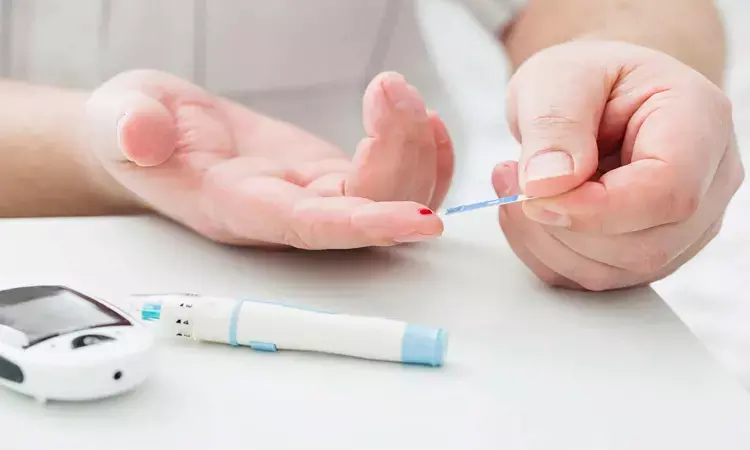- Home
- Medical news & Guidelines
- Anesthesiology
- Cardiology and CTVS
- Critical Care
- Dentistry
- Dermatology
- Diabetes and Endocrinology
- ENT
- Gastroenterology
- Medicine
- Nephrology
- Neurology
- Obstretics-Gynaecology
- Oncology
- Ophthalmology
- Orthopaedics
- Pediatrics-Neonatology
- Psychiatry
- Pulmonology
- Radiology
- Surgery
- Urology
- Laboratory Medicine
- Diet
- Nursing
- Paramedical
- Physiotherapy
- Health news
- Fact Check
- Bone Health Fact Check
- Brain Health Fact Check
- Cancer Related Fact Check
- Child Care Fact Check
- Dental and oral health fact check
- Diabetes and metabolic health fact check
- Diet and Nutrition Fact Check
- Eye and ENT Care Fact Check
- Fitness fact check
- Gut health fact check
- Heart health fact check
- Kidney health fact check
- Medical education fact check
- Men's health fact check
- Respiratory fact check
- Skin and hair care fact check
- Vaccine and Immunization fact check
- Women's health fact check
- AYUSH
- State News
- Andaman and Nicobar Islands
- Andhra Pradesh
- Arunachal Pradesh
- Assam
- Bihar
- Chandigarh
- Chattisgarh
- Dadra and Nagar Haveli
- Daman and Diu
- Delhi
- Goa
- Gujarat
- Haryana
- Himachal Pradesh
- Jammu & Kashmir
- Jharkhand
- Karnataka
- Kerala
- Ladakh
- Lakshadweep
- Madhya Pradesh
- Maharashtra
- Manipur
- Meghalaya
- Mizoram
- Nagaland
- Odisha
- Puducherry
- Punjab
- Rajasthan
- Sikkim
- Tamil Nadu
- Telangana
- Tripura
- Uttar Pradesh
- Uttrakhand
- West Bengal
- Medical Education
- Industry
Intensive blood sugar and BP control lowers cardiac autonomic neuropathy risk in diabetes

USA: Treatment with tighter blood sugar and blood pressure targets decreases risk of cardiovascular autonomic neuropathy (CAN) in type 2 diabetes (T2D) patients at high risk for cardiovascular events, finds a recent study in the journal Diabetes Care. The results were obtained from posthoc analysis of the Action to Control Cardiovascular Risk in Diabetes (ACCORD) study.
The effective preventive interventions for CAN remain unclear. Yaling Tang, Joslin Diabetes Center and Harvard Medical School, Boston, Massachusetts, and colleagues therefore, examined the effect of intensively treating traditional risk factors for CAN, including dyslipidemia, hypertension, and hyperglycemia in patients with type 2 diabetes and high cardiovascular risk participating in the ACCORD trial.
CAN was defined as heart rate variability indices below the fifth percentile of the normal distribution. 71% (n = 7,275) of 10,251 ACCORD participants underwent a CAN evaluation at study entry and at least once after randomization. Using generalized linear mixed models, the effects of intensive interventions on CAN were analyzed among these subjects.
Key findings of the study include:
- As compared with standard intervention, intensive glucose treatment reduced CAN risk by 16% (odds ratio [OR] 0.84)—an effect driven by individuals without cardiovascular disease (CVD) at baseline (OR 0.73) rather than those with CVD (OR 1.10).
- Intensive blood pressure (BP) intervention decreased CAN risk by 25% (OR 0.75), especially in patients ≥65 years old (OR 0.66).
- Fenofibrate did not have a significant effect on CAN (OR 0.91).
"These data confirm a beneficial effect of intensive glycemic therapy and demonstrate, for the first time, a similar benefit of intensive BP control on CAN in T2D. A negative CVD history identifies T2D patients who especially benefit from intensive glycemic control for CAN prevention," wrote the authors.
"Intensive Risk Factor Management and Cardiovascular Autonomic Neuropathy in Type 2 Diabetes: The ACCORD Trial," is published in the journal Diabetes Care.
DOI: https://care.diabetesjournals.org/content/early/2020/11/02/dc20-1842
Dr Kamal Kant Kohli-MBBS, DTCD- a chest specialist with more than 30 years of practice and a flair for writing clinical articles, Dr Kamal Kant Kohli joined Medical Dialogues as a Chief Editor of Medical News. Besides writing articles, as an editor, he proofreads and verifies all the medical content published on Medical Dialogues including those coming from journals, studies,medical conferences,guidelines etc. Email: drkohli@medicaldialogues.in. Contact no. 011-43720751


